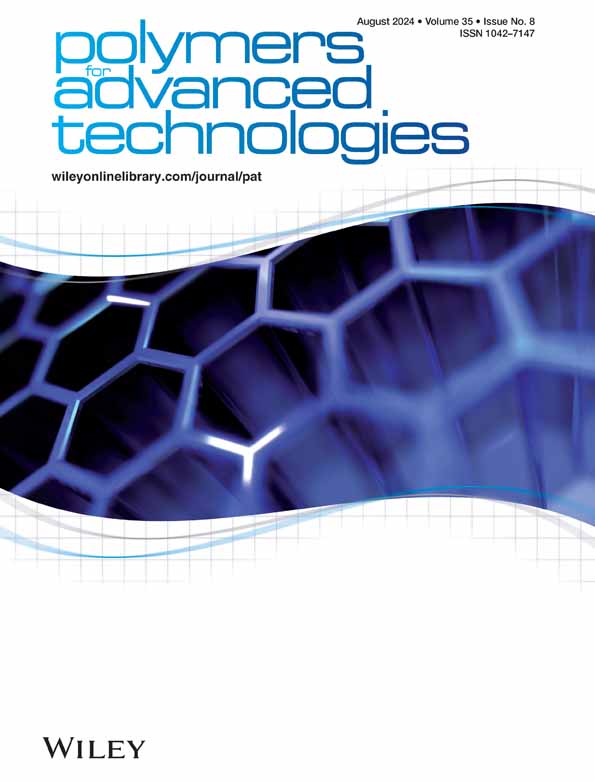Amphiphilic pluronic F68 biomaterial augmented oral bioavailability and anticancer activity of genistein in lung cancer treatment
IF 3.4
4区 工程技术
Q2 POLYMER SCIENCE
引用次数: 0
Abstract
Many phyto‐based drugs available suffer from adverse effects due to their lack of water solubility and poor bioavailability after oral administration. Genistein (Gen) is a plant‐derived isoflavone that possesses potent bioactive activity, including antioxidant, anti‐inflammatory, proapoptotic, and antiproliferative properties against cancer cells. However, due to its poor aqueous solubility and restricted bioavailability, its potential therapeutic utility is limited. Among various strategies, nanomicelles have played a significant role in enhancing solubility and bioavailability, as well as delivering drugs directly to the site of action. Therefore, our study aims to synthesize SA‐modified PF68 (PF68‐SA) polymer‐based nanomicelles and evaluate their effectiveness in cancer treatment. In brief, the Gen‐loaded PF68‐SA nanomicelles (GNM) were successfully fabricated and characterized by dynamic light scattering (DLS) and transmission electron microscopy (TEM) analysis. In vitro cytotoxicity assays performed on human lung A549 cancer cells showed that GNM exhibited higher anticancer effects compared with bolus Gen. Additionally, the observed maximum concentration (两亲性质子 F68 生物材料提高了治疗肺癌的染料木素的口服生物利用度和抗癌活性
由于缺乏水溶性和口服后生物利用度差,许多植物类药物都存在不良反应。染料木素(Genistein,Gen)是一种植物提取的异黄酮,具有强大的生物活性,包括抗氧化、抗炎、促凋亡和抗癌细胞增殖等特性。然而,由于其水溶性差、生物利用度有限,其潜在的治疗作用受到了限制。在各种策略中,纳米细胞在提高溶解度和生物利用度以及将药物直接输送到作用部位方面发挥了重要作用。因此,我们的研究旨在合成 SA 修饰的 PF68(PF68-SA)聚合物基纳米微囊,并评估其在癌症治疗中的有效性。简而言之,我们成功制备了基因负载 PF68-SA 纳米簇(GNM),并通过动态光散射(DLS)和透射电子显微镜(TEM)分析对其进行了表征。此外,GEN 悬浮液和 GNM 的最大浓度(Cmax)分别为 1.53 和 3.21 μg/mL,表明 GNM 比悬浮液吸收更快。与纯 GEN 悬浮液相比,GNM 的曲线下面积(AUC0-t)(16.5 对 6.38)、半衰期(t1/2)(3.55 对 2.49)和平均停留时间(5.52 对 4.34)均有所提高。因此,观察到的结果清楚地表明,以纳米微囊制剂给药后,GEN 的抗癌活性和生物利用度都有所提高。
本文章由计算机程序翻译,如有差异,请以英文原文为准。
求助全文
约1分钟内获得全文
求助全文
来源期刊

Polymers for Advanced Technologies
工程技术-高分子科学
CiteScore
6.20
自引率
5.90%
发文量
337
审稿时长
2.1 months
期刊介绍:
Polymers for Advanced Technologies is published in response to recent significant changes in the patterns of materials research and development. Worldwide attention has been focused on the critical importance of materials in the creation of new devices and systems. It is now recognized that materials are often the limiting factor in bringing a new technical concept to fruition and that polymers are often the materials of choice in these demanding applications. A significant portion of the polymer research ongoing in the world is directly or indirectly related to the solution of complex, interdisciplinary problems whose successful resolution is necessary for achievement of broad system objectives.
Polymers for Advanced Technologies is focused to the interest of scientists and engineers from academia and industry who are participating in these new areas of polymer research and development. It is the intent of this journal to impact the polymer related advanced technologies to meet the challenge of the twenty-first century.
Polymers for Advanced Technologies aims at encouraging innovation, invention, imagination and creativity by providing a broad interdisciplinary platform for the presentation of new research and development concepts, theories and results which reflect the changing image and pace of modern polymer science and technology.
Polymers for Advanced Technologies aims at becoming the central organ of the new multi-disciplinary polymer oriented materials science of the highest scientific standards. It will publish original research papers on finished studies; communications limited to five typewritten pages plus three illustrations, containing experimental details; review articles of up to 40 pages; letters to the editor and book reviews. Review articles will normally be published by invitation. The Editor-in-Chief welcomes suggestions for reviews.
 求助内容:
求助内容: 应助结果提醒方式:
应助结果提醒方式:


